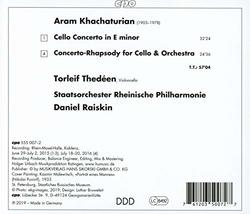| All Artists: Torleif Thedeen, Staatsorchester Rheinische Philharmonie Title: Khachaturian: Cello Concerto; Concerto Rhapsody Members Wishing: 1 Total Copies: 0 Label: Cpo Records Release Date: 4/5/2019 Genre: Classical Styles: Forms & Genres, Concertos Number of Discs: 1 SwapaCD Credits: 1 UPC: 761203500727 |
Search - Torleif Thedeen, Staatsorchester Rheinische Philharmonie :: Khachaturian: Cello Concerto; Concerto Rhapsody
 | Torleif Thedeen, Staatsorchester Rheinische Philharmonie Khachaturian: Cello Concerto; Concerto Rhapsody Genre: Classical Aram Khachaturian was an established Soviet artist when he realized an old dream of his in the first postwar year 1946 and composed a grand, quasi-symphonic work for his main instrument. Following his spectacular concertos... more » |
Larger Image |
CD Details
Synopsis
Product Description
Aram Khachaturian was an established Soviet artist when he realized an old dream of his in the first postwar year 1946 and composed a grand, quasi-symphonic work for his main instrument. Following his spectacular concertos for piano and for violin, which in the meantime had taken the world by storm, he now surprised his public with music that only gradually reveals its fiery temperament: we hear very clearly how well the composer knew the violoncello, the instrument on which during his study years he had practiced until his fingers hurt, in all its special qualities and how precisely he knew how to bring out its expressive and velvety autumnal personality. Neither this concerto nor the Rhapsody composed by Khachaturian seventeen years later for Mstislav Rostropovich can be mastered with mere virtuoso ostentation. Both works demand the services of a soloist who does not misunderstand the unprecedented difficulties of his parts as an opportunity for self-display, and Daniel Raiskin has found such an interpreter in the person of the Swedish cellist Thorleif Thedéen: sovereign in every technical respect, he surmounts the enormous challenges even when he removes himself from the intensive dialogues with the orchestra and left entirely to his own devices captures the whole of Khachaturian in the monologues.
